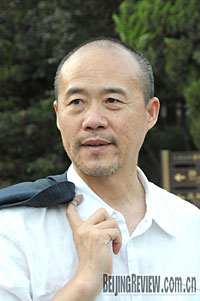|

AT THE HELM: Wang Shi, Chairman of Vanke Co. Ltd., says his property development company will streamline its home building business and create uniform standards for its apartment complexes (FAN TEXI)
Some industry analysts say this indicates that strong demand will resurface if developers are prepared to reduce their high profit margins.
According to Pan, Vanke "met no substantial resistance except oral scorn and protest from developers" in the Yangtze River Delta, who blamed it for "taking away from their hands the market share and sale volume" while "leaving them struggling with the fact that potential buyers would anticipate property prices to plunge further."
Xiao said apartments with gross floor area of fewer than 90 square meters accounted for 46 percent of the company's sales in the first half of this year. About 72 percent of the purchasers were buying their first apartment or a new one for more comfortable living conditions.
"Customers looking for apartments to settle down in will become a major force of the inelastic demand in the property market," Xiao said. "Because they are sensitive to the prices, the total price of an apartment in particular, large luxurious apartments enjoying no advantages in neighborhood conveniences, the environment or public services available will be unmarketable."
Cash is king
The strategy of Vanke, a developer focusing only on residential complexes, is "to speed up the cash cycle as fast as it can, because the efficiency of capital utilization is crucial to its profitability, its returns to shareholders and the company's operational security," Xiao said.
Unlike Vanke, many developers in China undertake both residential and commercial projects, because commercial properties ensure them adequate cash flows and allow them to avoid risks during cyclical fluctuations in the real estate industry. Soho China, for example, stopped building residential properties three years ago and now focuses on building commercial and office properties in vibrant and bustling areas in downtown Beijing.
At present, Vanke has about 160 residential projects under construction, the most among domestic property developers. The company would continue to dedicate itself to residential project development, Xiao said. This would require it to start building more residential projects and put them up for sale as quickly as possible to get cash and increase company profit, he added.
While most developers usually spend a lot of money acquiring plots of land for future development, Vanke has enough land reserves for two years' worth of development projects to enhance its cash flow, Xiao said. The average development cycle for the company's projects, from land acquisition to advanced sales, is 10-12 months, while many domestic developers need one to two years to complete that cycle, Xiao said.
According to Xiao, another reason why Vanke has offered apartment discounts is because it wants to muster all its resources and focus on small apartment development, where its traditional strengths lie.
According to the company's half-year report, Vanke had postponed the launch or completion of projects of up to 1 million square meters by June to redesign some of them to better attract buyers, Xiao said.
Vanke also needs cash to optimize land costs, Xiao said. Many developers have been unable to reclaim cash for a new round of expansion because of shrinking sales. As a result, they have had to auction some of their land this year. Vanke's land cost per square meter, for example, soared from 1,860 yuan ($273.53) in 2006 to 3,580 yuan ($526.47) in 2007, but fell to 2,155 yuan ($317) in the first half of this year. Having sufficient cash on hand now would let the company purchase land at cheaper prices and gain cost advantages for its future real estate projects.
In the meantime, Vanke has been cooperating with other property developers in various ways over the last few years to enhance its operational efficiency and cut costs. The company either works with other developers to acquire land or develops property projects with real estate investment funds and landowners.
Property developers have to become accustomed to making less money while they sharpen their sales edge, Yu Liang, President of Vanke, told China Real Estate Business newspaper. He added that Vanke's current profit margin is 14 percent, the average for China's real estate industry, although the world average is about 5 percent.
"Vanke's explosive development in the last two years tells us that the market is fair and that profit margin is doomed to return back to the industry average when it deviates too far," Yu was quoted as saying. | 